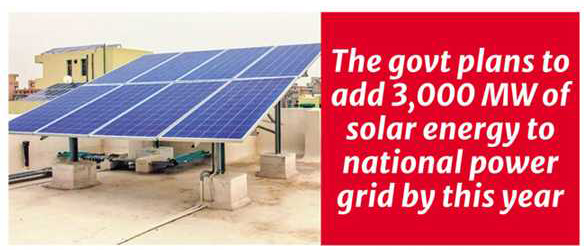
Published :
Updated :

Discussants at a discussion have called for devising a cautious, evidence-based programme for making the national rooftop solar programme more effective and result-oriented.
The call came at a discussion, jointly organised by the Centre for Policy Dialogue (CPD) CPD and the Bangladesh Solar and Renewable Energy Association (BSREA) in the city on Sunday.
In his opening remarks, CPD's Research Director Dr Khondaker Golam Moazzem welcomed the government's plan to install 3,000 megawatts (MW) capacity of rooftop solar energy on public buildings by December 2025 as part of its renewable energy goal of having a 20 per cent of electricity from renewable by 2030, and 30 per cent by 2040.
He also said: "The interim government plans to add 3,000 MW of solar energy to national power grid by this year, but earlier rooftop projects in Dhaka were symbolic rather than functional one, creating negative perceptions."
The previous failure must be taken into consideration to achieve the goal, he observed.
He suggested initiating solar power projects in the selected areas on pilot basis, based on solar potential and grid readiness before expanding the programme across the nation.
Delivering the keynote speech, CPD's Senior Research Associate Helen Mashiyat Preoty warned that premature implementation of any solar energy programme without feasibility studies or institutional clarity could undermine its desired outcomes.
"We must avoid a tick-box culture that values installation over actual power generation," she said.
She also suggested that the authorities should focus more on actual output rather than physical installations.
She proposed formation of a technical committee to oversee procurements and to finalise net energy metering (NEM) tariffs in coordination with utilities.
For sustainability, Ms Preoty urged Bangladesh Bank to introduce low-interest green energy loans with sovereign guarantees or escrow accounts.
Echoing the same concerns, BSREA General Member Nasir Uddin Chowdhury said: "Many rooftop systems in Dhaka didn't work. In my own building, none of the 3-5 kW units functioned."
Praising the rural solar home systems from 2003-2021, he said, "They worked for 25 years with regular maintenance. The failure was not in technology but in installation."
Mr. Moniruzzaman, Director of Renewable Energy and R&D at BPDB, said: "We're monitoring the implementation (of the programme) closely with a review committee and remote monitoring facilities to ensure efficient operation and grid stability."
Engr. Md Mujibur Rahman of SREDA mentioning that the previous systems had no consistent generation requirement, saying: "With NEM, we must revise meters and set minimum thresholds."
The PGCB's Chief Engineer, Sardar Zafrul Hasan, said grid integration would not be an issue, as battery storage projects of 100 MW and 35 MW are underway.
The BREB's Deputy Director Ramprasad Pal said rural co-ops lost revenue due to net metering and suggested that OPEX models could enable them to generate and sell power.
Defending NEM, GSOLARIC MD Engr. Naznin Akter said: "It (rooftop solar) worked well for industries. Hamim and Akij Groups can be the proof.
About the financing, former Bangladesh Bank director Khondkar Morshed Millat said the existing Tk 10-billion green refinancing fund supports rooftop projects and no separate scheme is needed.
The BSREA President Mostafa Al Mahmud highlighted the socio-economic impact, saying: "This programme could create more than two million jobs. It would reach grassroots communities and promote sustainable growth."
bdsmile@gmail.com


 For all latest news, follow The Financial Express Google News channel.
For all latest news, follow The Financial Express Google News channel.